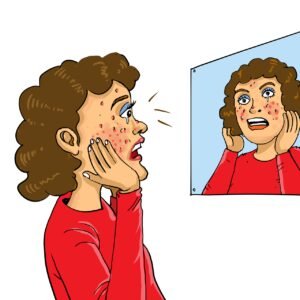Spotting the Signs: What Your Acne Breakouts Are Trying to Tell You

Having acne breakouts can be a nightmare for many. It is an unwelcome presence that can cause social anxieties and affect one’s self-esteem. While a dermatologist’s help is highly recommended in managing breakouts, it may prove beneficial to take note of certain triggers and symptoms that could be the underlying cause of a skin issue. Understanding the meaning behind acne breakouts can be key to preventing and treating future breakouts.
There can be many factors that can lead to an acne breakout, such as smoking, genetics, hormones and certain foods or beverages. Smoking can result in breakouts as it can weaken the skin barrier while also clogging pores with dirt and oils. Genetics are another factor as acne can sometimes be passed down through families, meaning if one’s family has a history of acne then the chances of having to manage breakouts may become a part of one’s skincare routine. Hormonal changes can also be a common trigger for acne, particularly during teenage years where the body is going through many changes. Foods and beverages, such as dairy and sugar, can also cause inflammation and clogging, leading to breakouts.
When it comes to diagnosing the cause of a breakout, it is important to take note of the location and type of acne that one is experiencing. For example, breakouts on different parts of the face can signify different causes. Breakouts on the forehead can indicate an overproduction of oil, while breakouts at the jawline may be the result of hormonal changes. It is also important to pay attention to the type of acne experienced. Acne comedones, also known as blackheads, are small and dark spots that are caused by impurities in the pores, while acne papules are raised plaques that are caused by bacteria and leave the skin inflamed.
The duration of the breakout can also provide insight into the cause, as breakouts that last for more than two weeks may be the result of a bacterial infection or ongoing hormonal issues. Unhealthy lifestyle habits, such as smoking, as well as inappropriate skincare routines, such as using products that are too harsh or contain ingredients that do not agree with one’s skin, can also lead to breakouts.
Overall, it is crucial to be mindful of acne breakouts and take note of certain factors that could help one pinpoint the cause of their breakouts. Knowing the location and type of acne, the duration of the breakout and understanding the triggers that may be causing it can help one better manage their skin. In cases where breakouts are not going away, an appointment with a dermatologist is always recommended to get to the root of the issue.

Comments